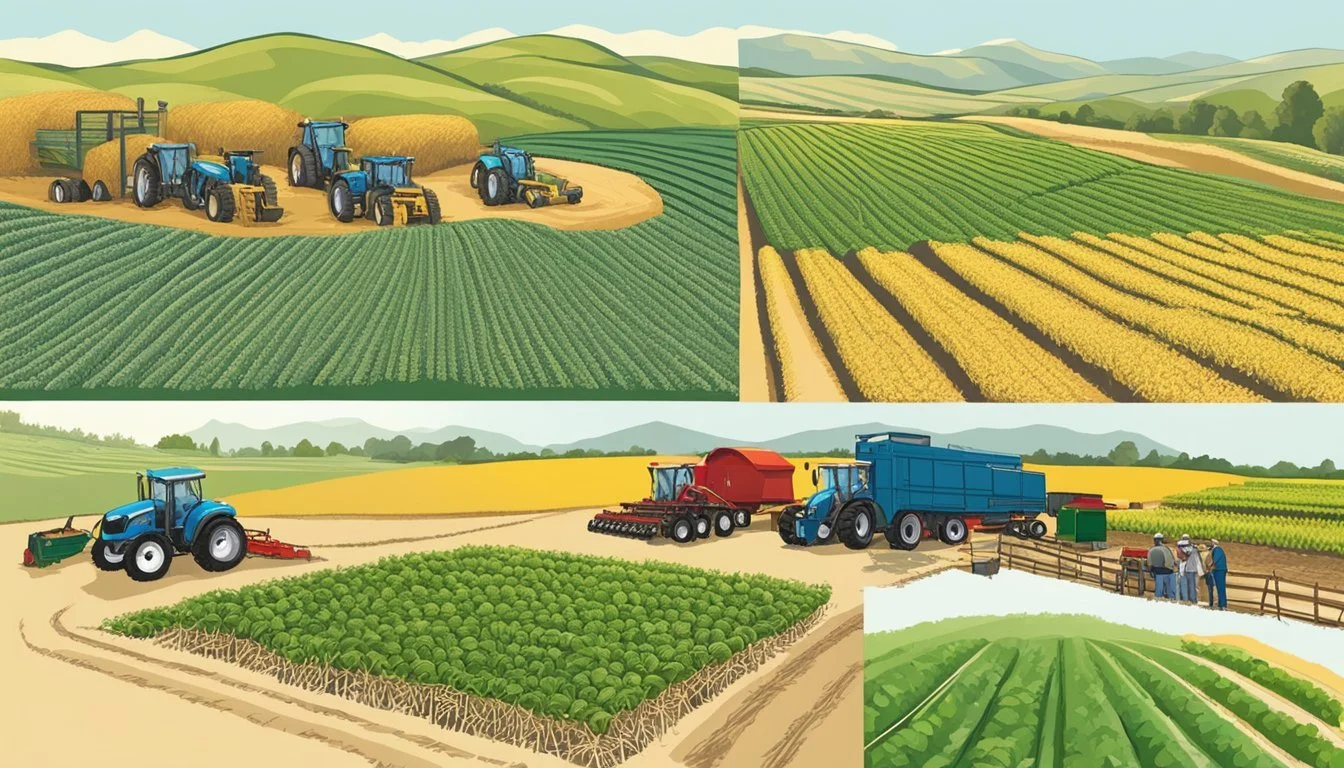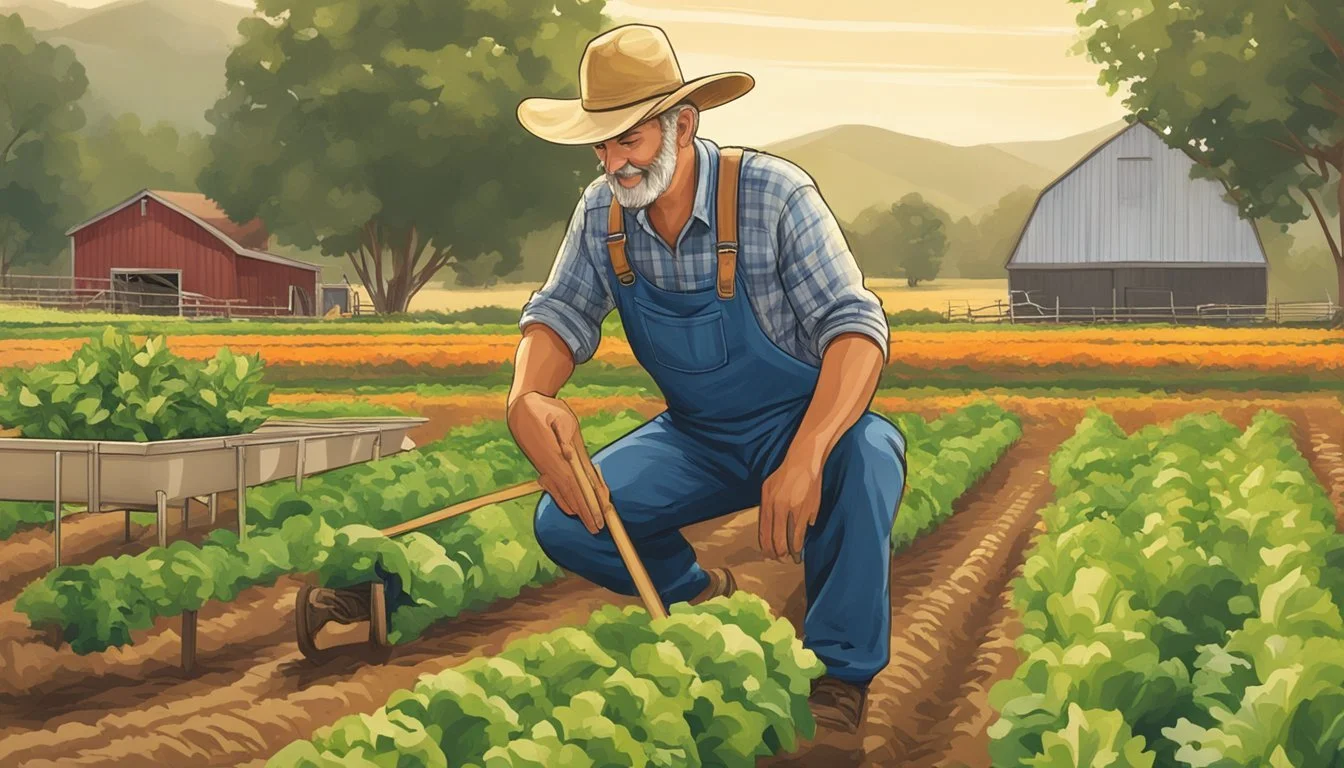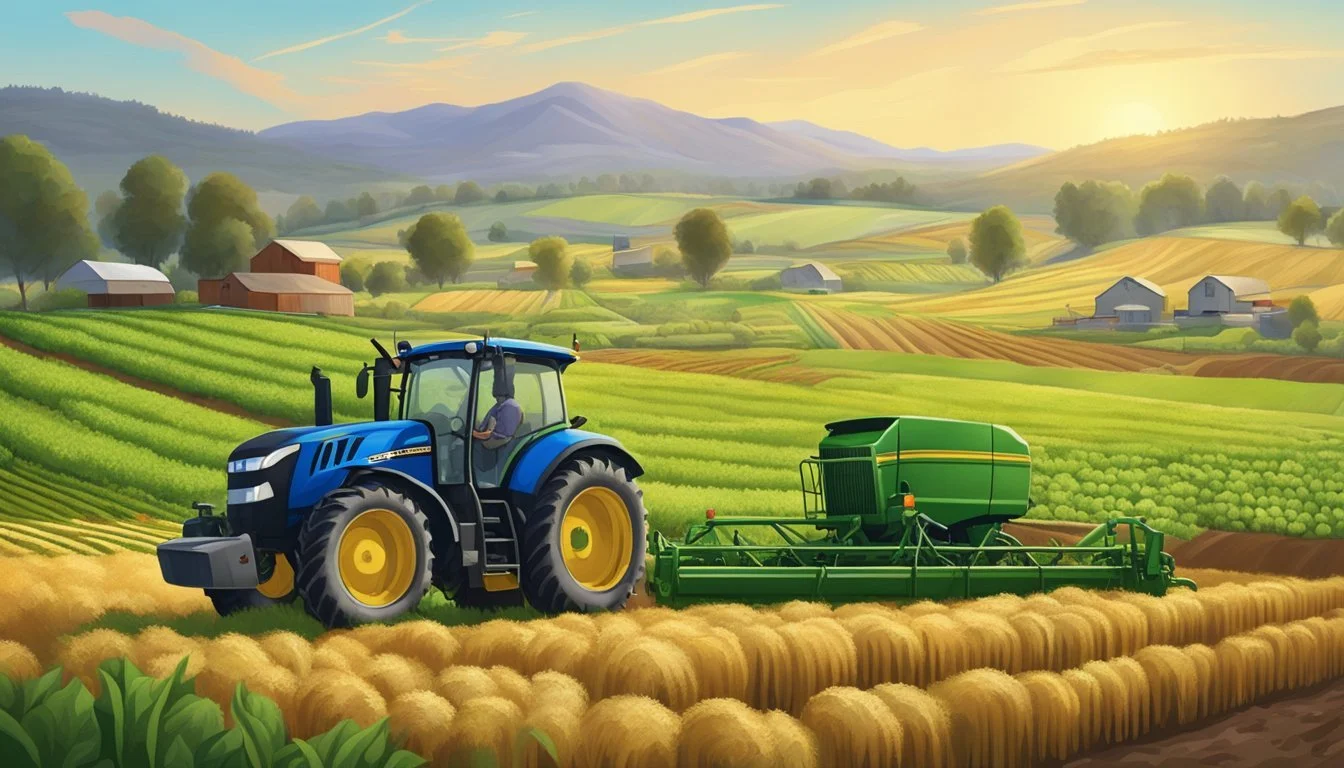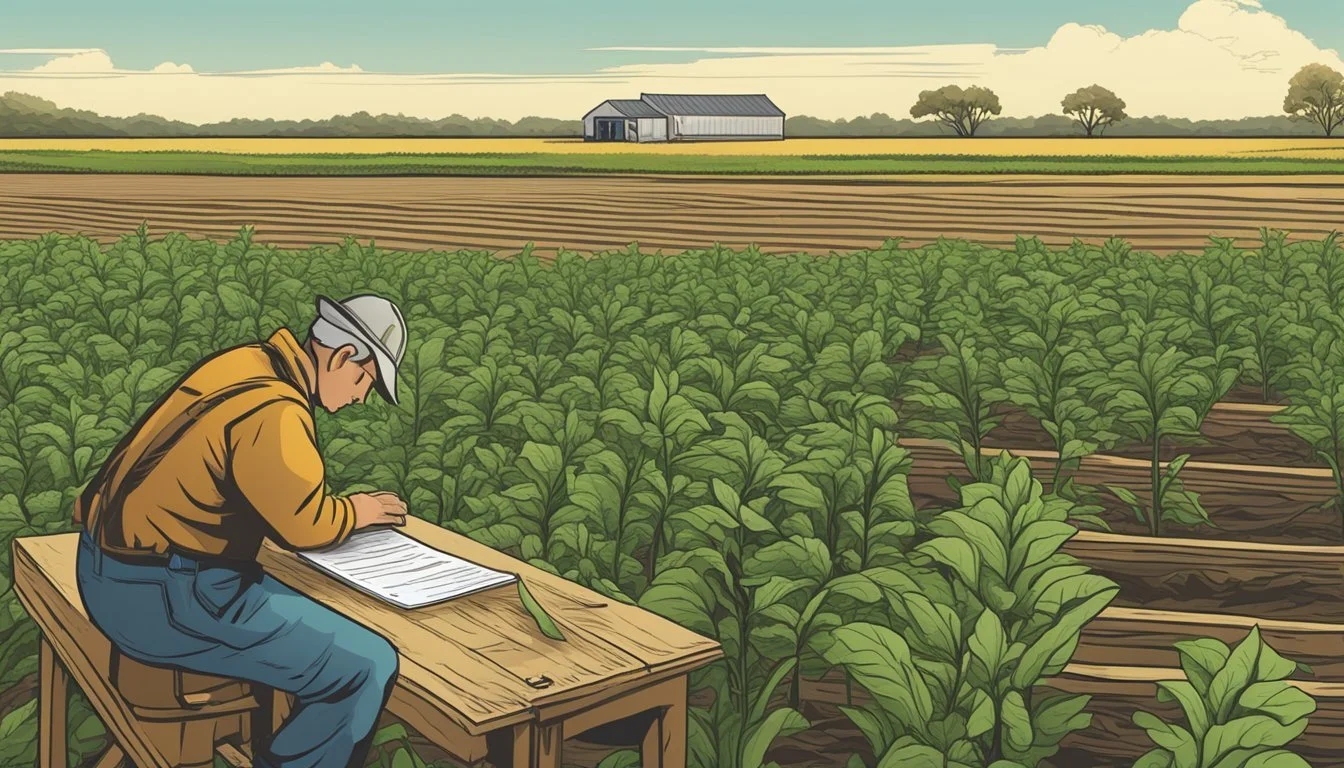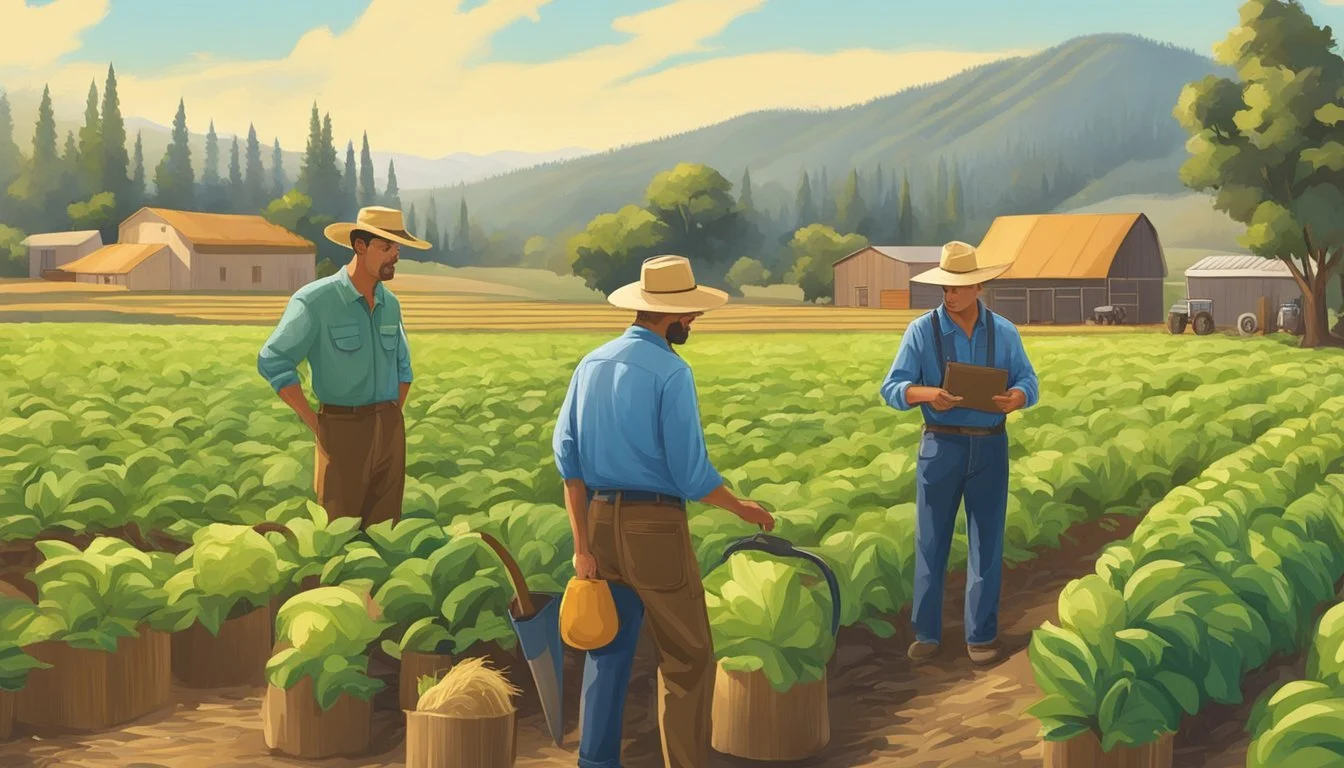Farming Grants California
Secure Funding for Your Agribusiness
In addressing the financial needs of California's agricultural sector, a diverse array of farming grants is available to support the state's farmers and ranchers. These grants aim to foster innovative agricultural practices, enhance the marketing of new products, and bolster the production capabilities of small and underserved producers. Entities like the California Department of Food and Agriculture (CDFA) operate programs such as the Biologically Integrated Farming Systems (BIFS) and the Urban Agriculture Grant Program, both of which are instrumental in promoting sustainable farming methods and urban agricultural initiatives.
California places a strong emphasis on supporting socially disadvantaged farmers, offering priority funding through various grant programs to ensure equitable opportunities within the sector. Programs like the California Underserved and Small Producer Grant (CUSP) bestow essential financial assistance, enabling projects that would otherwise lack resources to flourish. The Value Added Producer Grant (VAPG), managed by the United States Department of Agriculture (USDA), exemplifies the state's commitment to aiding agricultural producers in enhancing their products' value and expanding market reach, thus increasing farmer incomes and contributing to the state's vibrant agricultural economy.
By facilitating outreach, education, and research endeavors, these grants are critical to maintaining California's status as a leader in progressive and environmentally responsible agricultural practices. Each program is meticulously designed to address specific needs within the farming community, from integrating cutting-edge, plant-based systems to supporting urban agricultural viability. This structured approach to grant-making not only strengthens local food systems but also aligns with broader objectives of agricultural sustainability and innovation.
Overview of Farming Grants in California
California offers a variety of grants aiming to support the agriculture sector. These grants are designed to assist farmers and ranchers in adopting innovative practices, enhancing sustainability, and contributing to the food system’s economic vitality.
State-Level Assistance The California Department of Food and Agriculture (CDFA) administers multiple grant programs tailored for the diverse needs of California’s agricultural community. Priorities include funding for socially disadvantaged farmers, sustainable farming systems, and urban agriculture projects. Farmer Resource Portal and Urban Agriculture Grant Program are examples of such state-level initiatives.
CDFA Grant Programs:
Biologically Integrated Farming Systems (BIFS): Reduces chemical pesticide input.
Urban Agriculture: Enhances urban agriculture viability.
Federal Funding Opportunities At a federal level, programs such as the Value Added Producer Grants (VAPG) are accessible. VAPG is part of the broader Local Agriculture Market Program (LAMP) under the 2018 Farm Bill, offering planning grants and working capital.
VAPG Details:
Planning Grants: Up to $75,000
Working Capital Grants: Up to $250,000
Farmers and ranchers can also explore loans, technical assistance, and additional grant opportunities provided by the United States Department of Agriculture (USDA).
A diligent search through both state and federal resources can unveil numerous opportunities for funding in various sectors of California’s agriculture. In conclusion, understanding and utilizing these avenues for grants can significantly benefit agricultural stakeholders within the state.
Eligibility and Application Process
In California, a range of grant programs is available to support farming practices. Eligibility criteria and application processes may differ by program but they all aim to support farmers, ranchers, and other eligible entities in enhancing their agricultural practices.
Understanding Eligibility Criteria
Eligible entities for California farming grants often include farmers, ranchers, non-profits, government agencies, educational institutions, and business ventures majority-controlled by producers. Specific programs, like the Alternative Manure Management Program (AMMP), might require applicants to undertake certain practices such as pasture-based management or manure composting. It's imperative that entities review individual grant guidelines to determine their eligibility.
Application Steps and Deadlines
The application process typically involves:
Reviewing grant guidelines
Completing the required application form
Submitting additional documentation, such as project proposals or budgets.
Deadlines for applications are program-specific and are usually clearly stated in the grant notices. Entities are urged to apply within these deadlines to stand a chance for funding.
Technical Assistance for Applicants
Technical assistance is often available to applicants. Assistance providers help with understanding the application process, formulating project proposals, and ensuring that submissions meet the program's requirements. Technical assistance providers are typically experienced and can be sourced from government agencies or non-profit organizations. Entities should seek this assistance well in advance of the application deadline to ensure sufficient time for application preparation.
Types of Farming Grants Available
California farmers and ranchers have access to a variety of grants aimed at promoting sustainable agriculture, aiding in disaster recovery, fostering innovation, and providing education and training. These grants are designed to support environmental stewardship, foster research and demonstration projects, and offer technical assistance, while also paying special attention to the needs of socially disadvantaged farmers.
Grants for Sustainable Practices
Alternative Manure Management Program (AMMP): This program provides grants to dairy and livestock operations for the implementation of non-digester manure management practices that reduce greenhouse gas emissions.
Eligible Entities: Farmers and Ranchers, Tribal Governments
Focus: Climate Smart Agriculture, Environmental Stewardship
Sustainable Agricultural Lands Conservation Program (SALC): SALC grants fund the protection of critical agricultural lands from sprawl development, supporting carbon sequestration through conservation easements and land management plans.
Eligible Entities: Farmers, Ranchers, Land Trusts
Focus: Conservation, Climate Change Mitigation
California Farmland Conservancy Program (CFCP): This program aims to ensure the long-term durability of California's agricultural lands through conservation efforts, preserving the environmental and economic benefits for future generations.
Disaster Relief and Recovery Grants
California farmers often face natural calamities, such as droughts or fires. Grants like the RCD Financial Assistance Program and the Regional Forest and Fire Capacity Program provide financial aid to recover and rebuild, ensuring agricultural viability in the aftermath of disasters.
Eligible Entities: Farmers, Ranchers, Regional Conservation Districts
Focus: Disaster Recovery, Resilience Building
Innovative Agriculture Grants
Multibenefit Land Repurposing Program: Innovative grants that encourage repurposing agricultural land to address critical environmental concerns, such as water use and habitat restoration.
Eligible Entities: Farmers, Ranchers, Agricultural Landowners
Focus: Water Use, Ecosystem Services
Climate Smart Land Management Program: Grants targeting the enhancement of soil health, water efficiency, and overall sustainability in agricultural practices.
Eligible Entities: Farmers, Ranchers, Land Managers
Focus: Sustainable Practices, Research
Education and Training Grants
CDFA Office of Farm to Fork - Urban Agriculture Grant Program: This initiative supports urban agriculture with grants for education and training programs that advance the viability of urban farming practices.
Funding Period: February to May 2024
Eligible Entities: Urban Farmers, Educational Institutions, Non-profits
Focus: Urban Agriculture, Community Education
Application Assistance Programs: Available to socially disadvantaged farmers, these grants provide crucial support through education, training, and technical assistance to aid in grant application processes and fund accessibility.
By understanding and utilizing these grants, California's agriculture sector can continue to thrive while managing the delicate balance between productivity and sustainability.
State and Federal Grant Programs
California's agricultural sector benefits from various state and federal grant programs aimed at enhancing sustainable farming practices and supporting farmers and ranchers in their operations.
California Department of Food and Agriculture Grants
The California Department of Food and Agriculture (CDFA) offers several grant programs that support sustainability and innovation in agriculture. Significant grants include:
Biologically Integrated Farming Systems (BIFS): This program encourages the development and outreach of integrated, plant-based farming systems that reduce chemical inputs.
Healthy Soils Program: Grants are awarded to farmers implementing practices that improve soil health and carbon sequestration.
Alternative Manure Management Program: Supports the reduction of greenhouse gas emissions from manure on dairy and livestock farms.
Dairy Digester Research and Development Program (DDRDP): Funds dairy digesters, which capture methane emissions from manure and convert them into energy.
Pollinator Habitat Program: A program focused on enhancing pollinator habitats as well as providing direct benefits to agricultural operations.
United States Department of Agriculture Grants
The United States Department of Agriculture (USDA) extends multiple grant opportunities to farmers nationwide, including those in California:
Value-Added Producer Grants: Available to help agricultural producers enter into value-added activities related to the processing and marketing of new products.
Organic Transition Pilot Program: A program that supports farms converting to organic practices, helping to cover associated costs.
Both state and federal agencies maintain a strong commitment to investing in research, outreach, and the implementation of sustainable agricultural practices. These grants not only support individual farmers and ranchers but also contribute to broader environmental goals, such as reducing greenhouse gases and enhancing biodiversity.
Funding for Innovation and Expansion
California's commitment to modernizing agriculture through various grant programs provides essential resources for equipment, marketing, and business expansion. These grants aim to support the growth of small businesses, family farms, and beginning farmers, setting the stage for a more innovative and sustainable agricultural industry.
Grants for Equipment and Technology
Eligibility: Higher Education, Non-Profit, Tribal Gov, Small Businesses, Family Farms
The Biologically Integrated Farming Systems (BIFS) Program
Supports innovative, plant-based farming systems that reduce chemical inputs.
Offers funding for outreach, education, and research projects focused on sustainable practices.
Agriculture Management and Monitoring Program (AMMP)
Provides grants for equipment and technology that promote sustainable livestock management and manure treatment.
Marketing and Business Development Grants
Eligibility: Small Business Technical Assistance Providers, Non-Profits, Local Governments
California Office of the Small Business Advocate (CalOSBA)
Distributes grants to entities that help small businesses with marketing strategies and business planning.
Aims to bolster technical assistance and entrepreneurial growth.
Grants for Expanding Operations
Eligibility: Farmers, Gardeners, Urban Farmers, Suburbs, Government Officials, Schools, Stakeholders
Urban Agriculture and Innovative Production Grants (UAIP)
Aims to initiate or expand urban farming activities.
Addresses the needs of urban farmers to secure equipment, land, or infrastructure for growth.
Specialized Grant Opportunities
California provides a diverse range of specialized grant opportunities to support agriculture across different communities and practices. These opportunities are tailored to address the unique challenges and needs faced by various segments of the agricultural sector.
Grants for Culturally Specific Farming Practices
These grants focus on culturally specific farming practices, with priority funding available for socially disadvantaged farmers. They aim to acknowledge and nurture the diverse agricultural methods and crops that are integral to different cultures, providing financial assistance to uphold these traditions and encourage sustainable agricultural biodiversity.
Youth and Beginning Farmer Grants
Youth and beginning farmer grants are designed to support the next generation of agricultural professionals in California. Such grants supply crucial funding to young and novice farmers, empowering them to establish and expand their farming operations. They typically include educational components, assisting these farmers to lay a strong foundation for long-term success.
Urban Agriculture and Small Farm Grants
The Urban Agriculture Grant Program (UAGP) is a competitive one-time grant that enhances urban agriculture viability in urban areas throughout the state. Small farm operators can also benefit from grants that support innovative projects, boosting local food systems and community-oriented agriculture initiatives. These grants are often inclusive, encompassing education outreach and fostering connections with local food distribution networks.
Environmental Stewardship and Climate Grants
California's commitment to environmental stewardship and combatting climate change is demonstrated through a variety of grant programs aimed at transforming agricultural practices. These programs focus on enhancing soil health, reducing greenhouse gas emissions, and supporting water-efficient farming practices. They stimulate progress towards a sustainable agricultural sector capable of sequestering carbon and fostering climate change mitigation.
Grants for Soil and Water Conservation
Soil Health and Conservation Initiatives: Grants focusing on soil health prioritize sustainable farming techniques that nurture and protect soil quality. These initiatives often include funding for:
Healthy Soils Program: Designed to enhance soil organic matter, thus helping to sequester carbon and reduce agricultural greenhouse gas emissions.
Water Efficiency Technical Assistance: Facilitates water conservation by offering technical support to farmers, resulting in optimized water use and efficiency.
Prioritization Criteria:
Evidence of potential to substantially increase soil carbon levels.
Proven methods of conserving water resources in agricultural operations.
Climate Smart Agriculture Grants
Greenhouse Gas Reduction Approaches: Climate smart agriculture grants incentivize the adoption of practices that reduce emissions and increase energy efficiency on farms. These approaches include:
Methane Emission Reductions: Funding is available for projects that mitigate methane emissions from livestock and dairy operations.
Renewable Energy Investments: Supports the integration of renewable energy use in farming activities to lower dependency on fossil fuels.
Resilient Food Systems Program:
Infrastructure Support: Aims at building resilient food systems infrastructure that stands up well to the impacts of climate change.
Technical Assistance: Offers guidance and resources to transition toward climate-smart agricultural practices.
Statistics and Targets:
A measurable decrease in greenhouse gas emissions from targeted agricultural practices.
Enhanced capacity to withstand climate-related challenges through improved agricultural infrastructure.
Supporting Local and Regional Food Systems
California's initiatives to bolster local and regional food systems are multifaceted, focusing on increasing the diversity of agricultural production, enhancing infrastructure and distribution networks, and improving nutrition and food access. These efforts include specific grants designed to support a broad range of entities, from livestock and crop producers to institutions of higher education.
Grants for Livestock and Crop Diversity
The state provides financial assistance aiming to encourage a diverse array of crops and livestock species. Fund allocation supports farmers and ranchers in adopting practices that lead to the sustainable production of various grains, fruits, and dairy products while also promoting the use of dairy digesters to reduce environmental impact.
Categories of Supported Entities:
Livestock and dairy producers
Crop farmers with a focus on grains and fruits
Expected Outcomes:
Enhanced biodiversity in agricultural production
Improved sustainability and environmental stewardship
Infrastructure and Distribution Grants
California prioritizes grants that fortify the food supply chain's midsection, contributing to the development of processing facilities and distribution systems. These grants aim to provide better market access for small farms, fair pricing, and the creation of safe employment opportunities in the food sector.
Key Aspects of Infrastructure Support:
Development and enhancement of processing facilities
Strengthening distribution networks
Entities Benefited:
Small and mid-size farms
Food processing businesses
Distribution channels including institutions
Nutrition and Food Access Grants
Nutrition and food access grants focus on ensuring that fresh, healthy foods are readily available, especially in underserved communities. Assistance is provided to expand access to nutritious food options, benefiting the broader food system from producers to consumers.
Grant Objectives:
Bolstering nutrition in local communities
Expanding access to fresh, healthy food items
Entities Involved:
Local food cooperatives
Farm-to-school programs
Institutions promoting nutrition and food education
By providing these targeted grants, California aims to cultivate a resilient food system that supports healthy communities and a robust agricultural economy.
Disaster Recovery and Preparedness Grants
In California, farmers can access specific grants aimed at bolstering their operations against natural disasters and pandemics. These grants provide financial support to implement preventive measures and recover from damages caused by events such as droughts, floods, and COVID-19.
Grants for Flood and Drought Mitigation
California Department of Agriculture (CDFA) administers various grants to help farmers prepare for and respond to the impacts of floods and drought. Among these,
Emergency Conservation Program (ECP): Farmers receive funding to rehabilitate land severely damaged by natural disasters.
Resilient Food Systems Infrastructure Program: They may also apply for assistance under this program to develop projects that enhance their farm's resilience to climatic extremes.
These grants ensure that agricultural lands remain productive and that water conservation measures can be implemented swiftly in periods of severe drought. Eligible measures may include:
Installation of irrigation systems adapted to low water availability
Creation of emergency water sources for livestock
Pandemic Response Grants
In response to the COVID-19 pandemic, farmers had to adjust operations to maintain production and ensure food supply chains remained intact. Grants in this category aim to:
Provide immediate financial support to farmers affected by market disruptions.
Fund demonstration projects that showcase innovative practices to combat the effects of the pandemic on the farming sector.
This financial assistance helps maintain essential farm activities and facilitates the adoption of new strategies for a more resilient agricultural system in the face of health crises.
Educational Opportunities and Job Creation
California's agriculture sector is seeing significant investment in education and training initiatives aimed at equipping farmworkers with enhanced skills and creating new job opportunities. The focus on high-quality student engagement through institutional programs promises a more robust workforce.
Agricultural Education Grants
The California Department of Food and Agriculture (CDFA) administers grant programs that support the educational advancement of farmers and ranchers. These programs aim to maximize socially disadvantaged farmers' access to educational resources. Key Institutions: CDFA, La Cooperativa Campesina de California
Priority Sectors: Socially disadvantaged farmers
Services: Education enhancement, resource access
Workforce Development and Job Training
State initiatives, including those by the Employment Training Panel (ETP) and the Employment Development Department (EDD), allocate funding for training to help farmworkers acquire new skills. Key Entities: ETP, EDD, agricultural businesses
Funding: $10 million from ETP, $9 million from EDD to eligible organizations
Impact: Upskilling, higher wages, workforce stability
Implementation: A focus on job training programs contributes to workforce development, promoting a path to career advancement within California’s pivotal agricultural industry.
Resources and Event Information
California’s Department of Food and Agriculture (CDFA) provides a comprehensive suite of resources tailored for those looking to gain knowledge and funding for innovative, sustainable farming practices. It includes educational outreach, training programs, and extensive support through grants. The information below will detail key events and resources available for education and networking to support farmers and ranchers in California.
Grant Workshops and Seminars
The CDFA frequently holds workshops and seminars aimed at educating participants on how to apply for the various grants it offers. These often cover a range of topics, including:
Outreach and Education: Details on innovative farming systems and how to implement them.
Application Assistance: Guidance on filling out and submitting grant applications.
Such events are critical for entities like Higher Education institutions, Non-Profit organizations, and Tribal Governments, which are among the eligible entities for programs like the Biologically Integrated Farming Systems (BIFS) grants.
Networking and Industry Events
CDFA Home also plays a role in facilitating networking and industry events. These events provide opportunities to connect with peers, industry experts, and government officials. Particularly for socially disadvantaged farmers, events that prioritize these groups can be pivotal in gaining access to necessary resources. For example:
Farmworker Resource Center Grant Program: An example where the CDFA has offered a Notice of Funding Availability (NOFA) for certain grants. Deadlines and detailed information for these events are provided through their portals, ensuring applicants know exactly how and when to submit their applications.
Furthermore, the United States Department of Agriculture (USDA) often collaborates with CDFA and could provide additional educational and training resources relevant to California's agricultural community. Keeping abreast of the scheduled events, like grant program-specific office hours, ensures potential applicants have the most current and comprehensive information.
Grant Management and Reporting
Managing and reporting on grants are critical processes for any agricultural entity that receives funding. These steps ensure that funds are used effectively and that the outcomes align with the program's objectives.
Grant Funding Utilization
Entities receiving grant funds are responsible for allocating these monies to specified agricultural projects. The objective is to implement practices that lead to sustainable farming and reduced environmental impact. For instance, the Alternative Manure Management Program (AMMP) has specific guidelines that require funds to be used for non-digester manure management practices that result in greenhouse gas reduction. Technical assistance is often available to help grantees navigate the complexities of funding utilization to maximize both environmental benefits and market impact.
Compliance and Outcome Reporting
Grantees must adhere to compliance measures set forth by the grant program. This includes providing detailed reports on the outcomes of funded projects. For example, reliable documentation of reduced greenhouse emissions or advancements in climate-smart agriculture is a common requirement. Outcome reporting often demands meticulous record-keeping and analysis to determine the effectiveness of the applied research and practices in question. These reports play a pivotal role in informing stakeholders on how the grant positively influences the market and contributes to broader agricultural goals in California. Programs such as the California Department of Food and Agriculture's (CDFA) Conservation Agriculture Planning Grants Program place emphasis on the strategic actions taken for climate change mitigation and adaptation.
Additional Assistance Programs
California provides an array of additional assistance programs designed to bolster agricultural entities through financial aid and non-governmental support. These programs range from loans and financial assistance to partnerships with various organizations focused on strengthening agricultural production and food security.
Loan Programs and Financial Aid
Agricultural producers in California have the opportunity to benefit from various loan programs and financial aid options. These programs target a spectrum of needs, from the establishment of new crops to technical assistance for expanding market opportunities. The California Department of Food and Agriculture (CDFA) is instrumental in administering funds that improve the competitiveness of California specialty crops through the Specialty Crop Block Grant Program. Producers who are just starting, or who are from socially disadvantaged groups, may receive priority funding.
Furthermore, initiatives such as the Value-Added Producer Grant (VAPG) support producers in entering value-added activities, which can include the development of new products or the expansion of existing ones. Assistance extends to ensuring agricultural food security and may even encompass healthy refrigeration grant programs that aid in extending the shelf life of perishable goods.
Non-Governmental Support Initiatives
In addition to government-funded programs, California's agricultural producers can access support from a variety of non-governmental organizations. These entities provide technical assistance, training, as well as networking opportunities that can lead to increased producer income and sustainability. Agencies work collaboratively with tribes and local communities to tailor support initiatives that address the unique needs of these groups.
Non-governmental initiatives often bridge gaps not covered by governmental programs, offering flexible solutions and partnering with agricultural producers to foster the growth of a resilient agricultural sector. Access to such support networks is critical to maintaining a robust agro-economy within the state, enhancing producers' capacities to adapt to market demands and environmental challenges.



